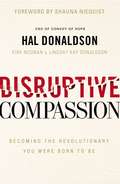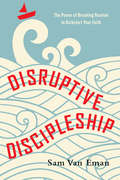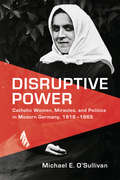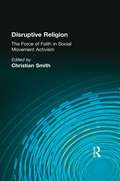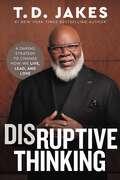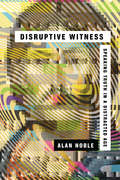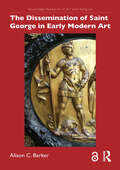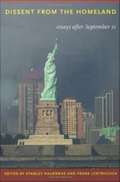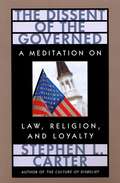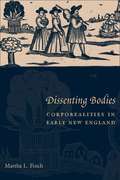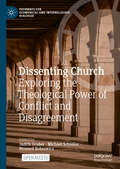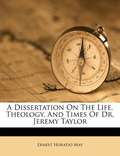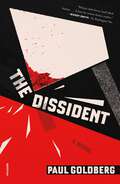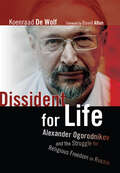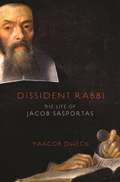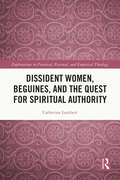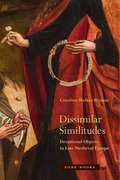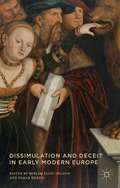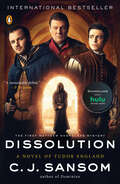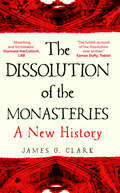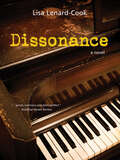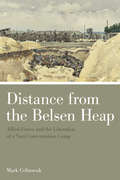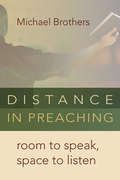- Table View
- List View
Disruptive Compassion: Becoming the Revolutionary You Were Born to Be
by Hal DonaldsonNo one ever said we'd save the world by playing it safe.As the daily newsfeed full of suffering and injustice scrolls by, it's all too easy to question what one person can really do to enact the profound change the world needs. Like moviegoers, we often watch and witness with care, but assume the script has already been written.Disruptive Compassion dares to make a bold counter: you possess the power to provoke real and meaningful change. Why? Because God has empowered you to rewrite the story of tomorrow. Over 2,000 years ago, Jesus created a model for revolutionaries that has been followed ever since. These principles are just as powerful to guide our journey today.With raw and inspiring stories from the world's most desperate places and his own journey to find meaning, Convoy of Hope founder and CEO Hal Donaldson will take you on a tour along the frontlines of courage and compassion. Let this book be your crash course in what it means to become a revolutionary, as you learn how to evaluate the resources you already have, navigate real concerns and risks, check your motives, and ultimately become equipped as an agitator with purpose. With principles and insights gleaned from two decades of relief work, Hal reveals what he’s learned from the journey and what we can take with us as we join the revolution.Disruptive Compassion be your invitation to move beyond pity, helplessness, and outrage, and let it be your playbook for making a difference right where you are.
Disruptive Discipleship: The Power of Breaking Routine to Kickstart Your Faith
by Sam Van EmanSometimes in the Christian life we get stuck. Something seems off, and we don't know why. We may not even notice it at first. But we feel like God is far from our daily lives, or we lose hope for the future, or we don't treat others in loving ways. What can we do? Sam Van Eman has found that our spiritual lives need disruptive experiences, which can jolt and reorient us for greater spiritual maturity. Out-of-the-ordinary activities can challenge our assumptions and give us space to consider new perspectives. And when we intentionally choose to pursue designed experiences, we stretch our faith in new and unexpected ways. Filled with concrete examples of how ordinary people are shaped by disruptive experiences, this book provides a path to deeper faith on purpose. Jesus disrupted his disciples with invitations to get out of their boats, leave their nets, and follow him. Have courage, and discover what those kinds of disruptions might look like for you.
Disruptive Power: Catholic Women, Miracles, and Politics in Modern Germany, 1918-1965 (German and European Studies)
by Michael E. O'SullivanDisruptive Power examines a surprising revival of faith in Catholic miracles in Germany from the 1920s to the 1960s. The book follows the dramatic stigmata of Therese Neumann of Konnersreuth and her powerful circle of followers that included theologians, Cardinals, politicians, journalists, monarchists, anti-fascists, and everyday pilgrims. Disruptive Power explores how this and other similar groups negotiated the precariousness of the Weimar Republic, the repression of the Third Reich, and the dynamic early years of the Federal Republic. Analyzing a network of rebellious traditionalists, O’Sullivan illustrates the divisions that characterized the German Catholic minority as they endured the tumultuous era of the world wars. Analyzing material from archives in Germany and the United States, Michael E. O’Sullivan investigates the unsanctioned but very popular visions in several rural towns after World War II, providing micro-histories that illuminate the impact of mystical faith on religiosity, politics, and gender norms.
Disruptive Religion: The Force of Faith in Social Movement Activism
by Christian SmithReligion has long played a central role in many social and political movements. Solidarity in Poland, anti-apartheid in South Africa, Operation Rescue in the United States--each of these movements is driven by the energy and sustained by the commitment of many individuals and organizations whose ideologies are shaped and powered by religious faith. In many cases, religious resources and motives serve as crucial variables explaining the emergence of entire social movements. Despite the crucial role of religion in most societies, this religious activism remains largely uninvestigated. Disruptive Religion intends to fill this void by analyzing contemporary social movements which are driven by people and organizations of faith. Upon a firm base of empirical evidence, these essays also address many theoretical issues arising in the study of social movements and disruptive politics.
Disruptive Thinking: A Daring Strategy to Change How We Live, Lead, and Love
by T. D. Jakes*A NEW YORK TIMES BESTSELLER!* Think differently and find the courage to challenge the status quo with this mindset-shifting guide to meaningful change. For most of our lives, we are encouraged to trudge along the well-worn paths of those who have come before us. We learn the rules – in our families, in our schools, in our workplaces, in our churches – and most of the messages we receive tell us that following the rules will allow us to arrive at the lives we desire. But when change becomes not only desirable but also urgently necessary, this way of being no longer serves us. In fact, in every human endeavor, every major leap forward, has involved a cataclysmic challenge to existing ways of thinking and being. Breakthroughs, by definition, run against the grain and almost always encounter skepticism and opposition. In this book for leaders, thinkers, doers, and creators, Bishop T.D. Jakes illuminates the pathway to encouraging and unleashing disruptive thinking and provides the wisdom and practical skills we need to evolve our most original and potentially transformational ideas from vision to reality. Through his insight into how our minds and emotions work and through his experiences as a pastor, entrepreneur, and creator, Bishop Jakes leads us into a new way of relating to and transforming the world around us for good. Disruptive Thinking will show you the mindset and the tools you need to create groundbreaking and meaningful change in your own life and in the world around you.A Study Guide is also available for purchase.
Disruptive Witness: Speaking Truth in a Distracted Age
by Alan NobleWhat should Christian witness look like in our contemporary society? In this timely book, Alan Noble looks at our cultural moment, characterized by technological distraction and the growth of secularism, laying out individual, ecclesial, and cultural practices that disrupt our society's deep-rooted assumptions and point beyond them to the transcendent grace and beauty of Jesus.
The Dissemination of Saint George in Early Modern Art (Routledge Research in Art and Religion)
by Alison C. BarkerFocusing on England, the German-speaking territories and the Italian peninsula, this book examines how Saint George’s image crossed boundaries and was disseminated.Alison Barker attempts to "dissolve" the boundary of the Alps through examination of images of Saint George, the "travelling" saint. She argues that George’s status as chivalric hero and Christian martyr made him uniquely qualified to cross boundaries in this way, especially through the networks of courts and court culture. Her research demonstrates how the highly recognisable iconography of Saint George’s image meant something different, depending on where he was represented and who was looking at him. Through four case studies that examine how he was depicted and viewed across boundaries of space and media, this book charts a multi-layered cultural network, linking different artists and audiences from three regions. Each case study makes a claim about Saint George and how he acts and is used by four sections of society: rulers, artists, corporate groups and the broad masses.The book will be of interest to scholars working in art history, religious history and Renaissance studies.
Dissent from the Homeland: Essays After September 11
by Stanley Hauerwas Frank LentricchiaDissent from the Homeland is a book about patriotism, justice, revenge, American history and symbology, art and terror, and pacifism. In this deliberately and urgently provocative collection, noted writers, philosophers, literary critics, and theologians speak out against the war on terrorism and the government of George W. Bush as a response to the events of September 11, 2001. Critiquing government policy, citizen apathy, and societal justifications following the attacks, these writers present a wide range of opinions on such issues as contemporary American foreign policy and displays of patriotism in the wake of the disaster. Whether illuminating the narratives that have been used to legitimate the war on terror, reflecting on the power of American consumer culture to transform the attack sites into patriotic tourist attractions, or insisting that to be a Christian is to be a pacifist, these essays refuse easy answers. They consider why the Middle East harbors a deep-seated hatred for the United States. They argue that the U. S. drive to win the cold war made the nation more like its enemies, leading the government to support ruthless anti-Communist tyrants such as Mobutu, Suharto, and Pinochet. They urge Americans away from the pitfall of national self-righteousness toward an active peaceableness--an alert, informed, practiced state of being--deeply contrary to both passivity and war. Above all, the essays assembled in Dissent from the Homeland are a powerful entreaty for thought, analysis, and understanding. Originally published as a special issue of the journal South Atlantic Quarterly, Dissent from the Homeland has been expanded to include new essays as well as a new introduction and postscript. from Dissent from the Homeland: "An economy based on waste is inherently and hopelessly violent, and war is its inevitable by-product. We need a peaceable economy. "--Wendell Berry, conservationist, farmer, essayist, novelist, and poet "'God Bless America' is not a hymn any Christian can or should sing. At least it is not a hymn any Christian can or should sing unless it is understood that God's blessing incurs God's judgement. "--Stanley Hauerwas "The hardest thing in the world is to know how to act so as to make the difference that can be made; to know how and why that differs from the act that only releases or expresses the basic impotence of resentment. "--Rowan Williams, Archbishop of Canterbury "[I]t is instructive to step away for a moment and to deny that it is natural and self-explanatory for masses of people to be devastated by catastrophe in which they have lost no one they know, in a place with which they have no particular connections. Is nationality really such a natural function of human or even social being? . . . [I]s pity or sympathy really so innate a feature of the human constitution?"--Fredric Jameson "America is threatened by the most powerful enemy in its history, the administration of George W. Bush. "--Frank Lentricchia Contributors. Srinivas Aravamudan, Michael J. Baxter, Jean Baudrillard, Robert N. Bellah, Daniel Berrigan, Wendell Berry, Vincent J. Cornell, David James Duncan, Stanley Hauerwas, Fredric Jameson, Frank Lentricchia, Catherine Lutz, Jody McAuliffe, John Milbank, Peter Ochs, Donald E. Pease, Anne R. Slifkin, Rowan Williams, Susan Willis, Slavoj Zizek
The Dissent of the Governed: A Meditation on Law, Religion, and Loyalty (The William E. Massey Sr. Lectures in the History of American Civilization #9)
by Stephen L. CarterBetween loyalty and disobedience; between recognition of the law's authority and realization that the law is not always right: In America, this conflict is historic, with results as glorious as the mass protests of the civil rights movement and as inglorious as the armed violence of the militia movement. In an impassioned defense of dissent, Stephen L. Carter argues for the dialogue that negotiates this conflict and keeps democracy alive. His book portrays an America dying from a refusal to engage in such a dialogue, a polity where everybody speaks, but nobody listens. The Dissent of the Governed is an eloquent diagnosis of what ails the American body politic--the unwillingness of people in power to hear disagreement unless forced to--and a prescription for a new process of response. Carter examines the divided American political character on dissent, with special reference to religion, identifying it in unexpected places, with an eye toward amending it before it destroys our democracy. At the heart of this work is a rereading of the Declaration of Independence that puts dissent, not consent, at the center of the question of the legitimacy of democratic government. Carter warns that our liberal constitutional ethos--the tendency to assume that the nation must everywhere be morally the same--pressures citizens to be other than themselves when being themselves would lead to disobedience. This tendency, he argues, is particularly hard on religious citizens, whose notion of community may be quite different from that of the sovereign majority of citizens. His book makes a powerful case for the autonomy of communities--especially but not exclusively religious--into which democratic citizens organize themselves as a condition for dissent, dialogue, and independence. With reference to a number of cases, Carter shows how disobedience is sometimes necessary to the heartbeat of our democracy--and how the distinction between challenging accepted norms and challenging the sovereign itself, a distinction crucial to the Declaration of Independence, must be kept alive if Americans are to progress and prosper as a nation.
Dissent on Core Beliefs: Religious and Secular Perspectives (The Ethikon Series in Comparative Ethics)
by Simone Chambers Peter NoscoDifference, diversity and disagreement are inevitable features of our ethical, social and political landscape. This collection of new essays investigates the ways that various ethical and religious traditions have dealt with intramural dissent; the volume covers nine separate traditions: Confucianism, Buddhism, Christianity, Judaism, Islam, liberalism, Marxism, South Asian religions and natural law. Each chapter lays out the distinctive features, history and challenges of intramural dissent within each tradition, enabling readers to identify similarities and differences between traditions. The book concludes with an Afterword by Michael Walzer, offering a synoptic overview of the challenge of intramural dissent and the responses to that challenge. Committed to dialogue across cultures and traditions, the collection begins that dialogue with the common challenges facing all traditions: how to maintain cohesion and core values in the face of pluralism, and how to do this in a way that is consistent with the internal ethical principles of the traditions. Each essay uses contemporary as well as historical illustrations to tackle questions of pluralism and dissent. Discusses multiple religious and ethical traditions in an accessible way. The chapters employ a common rubric facilitating comparison across essays and across traditions.
Dissenting Bodies: Corporealities in Early New England
by Finch Martha L.For the Puritan separatists of seventeenth-century New England, "godliness," as manifested by the body, was the sign of election, and the body, with its material demands and metaphorical significance, became the axis upon which all colonial activity and religious meaning turned. Drawing on literature, documents, and critical studies of embodiment as practiced in the New England colonies, Martha L. Finch launches a fascinating investigation into the scientific, theological, and cultural conceptions of corporeality at a pivotal moment in Anglo-Protestant history. Not only were settlers forced to interact bodily with native populations and other "new world" communities, they also fought starvation and illness; were whipped, branded, hanged, and murdered; sang, prayed, and preached; engaged in sexual relations; and were baptized according to their faith. All these activities shaped the colonists' understanding of their existence and the godly principles of their young society. Finch focuses specifically on Plymouth Colony and those who endeavored to make visible what they believed to be God's divine will. Quakers, Indians, and others challenged these beliefs, and the constant struggle to survive, build cohesive communities, and regulate behavior forced further adjustments. Merging theological, medical, and other positions on corporeality with testimonies on colonial life, Finch brilliantly complicates our encounter with early Puritan New England.
Dissenting Bodies: Corporealities in Early New England
by Martha FinchFor the Puritan separatists of seventeenth-century New England, "godliness," as manifested by the body, was the sign of election, and the body, with its material demands and metaphorical significance, became the axis upon which all colonial activity and religious meaning turned. Drawing on literature, documents, and critical studies of embodiment as practiced in the New England colonies, Martha L. Finch launches a fascinating investigation into the scientific, theological, and cultural conceptions of corporeality at a pivotal moment in Anglo-Protestant history. Not only were settlers forced to interact bodily with native populations and other "new world" communities, they also fought starvation and illness; were whipped, branded, hanged, and murdered; sang, prayed, and preached; engaged in sexual relations; and were baptized according to their faith. All these activities shaped the colonists' understanding of their existence and the godly principles of their young society. Finch focuses specifically on Plymouth Colony and those who endeavored to make visible what they believed to be God's divine will. Quakers, Indians, and others challenged these beliefs, and the constant struggle to survive, build cohesive communities, and regulate behavior forced further adjustments. Merging theological, medical, and other positions on corporeality with testimonies on colonial life, Finch brilliantly complicates our encounter with early Puritan New England.
Dissenting Church: Exploring the Theological Power of Conflict and Disagreement (Pathways for Ecumenical and Interreligious Dialogue)
by Michael Schüßler Judith Gruber Ryszard BobrowiczThis book challenges the prevailing notion of stability, cohesiveness, and uniformity within Christian communities, inviting readers to view contestation and disagreement as integral to theological reflection and church identity. While the volume focuses predominantly on the Roman Catholic Church as a case study, various chapters broaden the exploration across other Christian and non-Christian traditions. Beginning with the philosophical and theological foundations of conflict, contestation, and community, the book subsequently focuses on four main conflict fields: liturgy, canon law, gender, and sexuality, as well as race and postcolonial critical theory. The book finishes with a constructive proposal on how to think theologically about identity and antagonisms, as well as how to construct an ecclesiology of dissent. Contributors employ diverse methodological perspectives to offer constructive theological reflections, enhancing both understanding and practice of theology in the context of polarised public debates.This is an open access book.
A Dissertation on the Life, Theology, and Times of Dr. Jeremy Taylor
by Ernest Horatio May<p>Although the name of Jeremy Taylor is a household word to thousands, but few pens have been employed upon his life and writings. The reason is not hard to discover. In a busy age like the present, men rarely have either the time or inclination to study the voluminous works which this eminent divine has bequeathed to the world. <p>The following pages are intended to supply a brief digest of Taylor's complete writings. The limits of a dissertation necessarily prevent the analysis from being exhaustive, but it is hoped that it is sufficiently full to escape the dilemma of the Roman of old: "Brevis esse laboro Obscurus fio."</p>
The Dissident: A Novel
by Paul Goldberg“A feast for serious fiction readers.” —Wendy Smith, The Washington Post“A dead-serious, dead-funny, no-he-didn't marvel.” —Joshua Cohen, author of The NetanyahusA thrilling, witty, and slyly original Cold War mystery about a ragtag group of Jewish refuseniks in Moscow.On his wedding day in 1976, Viktor Moroz stumbles upon a murder scene: two gay men, one of them a U.S. official, have been axed to death in Moscow. Viktor, a Jewish refusenik, is stuck in the Soviet Union because the government has denied his application to leave for Israel; he sits “in refusal” alongside his wife and their group of intellectuals, Jewish and not. But the KGB spots Viktor leaving the murder scene. Plucked off the street, he’s given a choice: find the murderer or become the suspect of convenience. His deadline is nine days later, when Henry Kissinger will be arriving in Moscow. Unsolved ax murders, it seems, aren’t good for politics.A whip-smart, often hilarious Cold War thriller, Paul Goldberg’s The Dissident explores what it means to survive in the face of impossible choices and monumental consequences. To help solve the case, Viktor ropes in his community, which includes his banned-text-distributing wife, a hard-drinking sculptor, a Russian priest of Jewish heritage, and a visiting American intent on reliving World War II heroics. As Viktor struggles to determine whom to trust, he’s forced to question not only the KGB’s murky motives but also those of his fellow refuseniks—and the man he admires above all: Kissinger himself.Immersive, unpredictable, and always ax-sharp, The Dissident is Cold War intrigue at its most inventive. It is an uncompromising look at sacrifice, community, and the scars of history and identity, from an expert storyteller.
Dissident for Life: Alexander Ogorodnikov and the Struggle for Religious Freedom in Russia
by Koenraad De WolfThis gripping book tells the largely unknown story of longtime Russian dissident Alexander Ogorodnikov -- from Communist youth to religious dissident, in the Gulag and back again. Ogorodnikov's courage has touched people from every walk of life, including world leaders such as Bill Clinton, Ronald Reagan, and Margaret Thatcher.In the 1970s Ogorodnikov performed a feat without precedent in the Soviet Union: he organized thousands of Protestant, Orthodox, and Catholic Christians in an underground group called the Christian Seminar. When the KGB gave him the option to leave the Soviet Union rather than face the Gulag, he firmly declined because he wanted to change "his" Russia from the inside out. His willingness to sacrifice himself and be imprisoned meant leaving behind his wife and newborn child.Ogorodnikov spent nine years in the Gulag, barely surviving the horrors he encountered there. Despite KGB harassment and persecution after his release, he refused to compromise his convictions and went on to found the first free school in the Soviet Union, the first soup kitchen, and the first private shelter for orphans, among other accomplishments.Today this man continues to carry on his struggle against government detainments and atrocities, often alone. Readers will be amazed and inspired by Koenraad De Wolf's authoritative account of Ogorodnikov's life and work.
Dissident Rabbi: The Life of Jacob Sasportas
by Yaacob DweckIn 1665, Sabbetai Zevi, a self-proclaimed Messiah with a mass following throughout the Ottoman Empire and Europe, announced that the redemption of the world was at hand. As Jews everywhere rejected the traditional laws of Judaism in favor of new norms established by Sabbetai Zevi, and abandoned reason for the ecstasy of messianic enthusiasm, one man watched in horror. Dissident Rabbi tells the story of Jacob Sasportas, the Sephardic rabbi who alone challenged Sabbetai Zevi's improbable claims and warned his fellow Jews that their Messiah was not the answer to their prayers.Yaacob Dweck's absorbing and richly detailed biography brings to life the tumultuous century in which Sasportas lived, an age torn apart by war, migration, and famine. He describes the messianic frenzy that gripped the Jewish Diaspora, and Sasportas's attempts to make sense of a world that Sabbetai Zevi claimed was ending. As Jews danced in the streets, Sasportas compiled The Fading Flower of the Zevi, a meticulous and eloquent record of Sabbatianism as it happened. In 1666, barely a year after Sabbetai Zevi heralded the redemption, the Messiah converted to Islam at the behest of the Ottoman sultan, and Sasportas's book slipped into obscurity.Dissident Rabbi is the revelatory account of a spiritual leader who dared to articulate the value of rabbinic doubt in the face of messianic certainty, and a revealing examination of how his life and legacy were rediscovered and appropriated by later generations of Jewish thinkers.
Dissident Women, Beguines, and the Quest for Spiritual Authority (Explorations in Practical, Pastoral and Empirical Theology)
by Catherine LambertDissident Women, Beguines, and the Quest for Spiritual Authority focuses on the responses of a group of twenty-first-century women to the lives and writings of thirteenth-century beguine mystics, and reveals how the struggle to discover their own inner spiritual authority connects two groups of women across centuries. For contemporary women who are disenchanted with the institutional church and who seek spiritual direction, models deeply rooted within the tradition may not be the most helpful. The author explores the value of exemplars from the fringes, ushering Hadewijch of Brabant, Mechthild of Magdeburg, and Marguerite Porete into the spotlight. The contemporary women studied developed a relationship with the beguines that transformed and influenced their own journeys. Their encounters underline the importance of re-membering the beguine mystics, the value of contemplative engagement with historical mystics, and the need for explicit validation of the richness of the edges of tradition within spiritual direction.Dissident Women, Beguines, and the Quest for Spiritual Authority will be of particular interest to scholars of mysticism and spirituality as well as practical, pastoral, and feminist theology.
Dissimilar Similitudes: Devotional Objects in Late Medieval Europe
by Caroline Walker BynumFrom an acclaimed historian, a mesmerizing account of how medieval European Christians envisioned the paradoxical nature of holy objectsBetween the twelfth and the sixteenth centuries, European Christians used in worship a plethora of objects, not only prayer books, statues, and paintings but also pieces of natural materials, such as stones and earth, considered to carry holiness, dolls representing Jesus and Mary, and even bits of consecrated bread and wine thought to be miraculously preserved flesh and blood. Theologians and ordinary worshippers alike explained, utilized, justified, and warned against some of these objects, which could carry with them both anti-Semitic charges and the glorious promise of heaven. Their proliferation and the reaction against them form a crucial background to the European-wide movements we know today as “reformations” (both Protestant and Catholic).In a set of independent but inter-related essays, Caroline Bynum considers some examples of such holy things, among them beds for the baby Jesus, the headdresses of medieval nuns, and the footprints of Christ carried home from the Holy Land by pilgrims in patterns cut to their shape or their measurement in lengths of string. Building on and going beyond her well-received work on the history of materiality, Bynum makes two arguments, one substantive, the other methodological. First, she demonstrates that the objects themselves communicate a paradox of dissimilar similitude—that is, that in their very details they both image the glory of heaven and make clear that that heaven is beyond any representation in earthly things. Second, she uses the theme of likeness and unlikeness to interrogate current practices of comparative history. Suggesting that contemporary students of religion, art, and culture should avoid comparing things that merely “look alike,” she proposes that humanists turn instead to comparing across cultures the disparate and perhaps visually dissimilar objects in which worshippers as well as theorists locate the “other” that gives their religion enduring power.
Dissimulation and Deceit in Early Modern Europe
by Miriam Eliav-Feldon Tamar HerzigIn this book, twelve scholars of early modern history analyse various categories and cases of deception and false identity in the age of geographical discoveries and of forced conversions: from two-faced conversos to serial converts, from demoniacs to stigmatics, and from self-appointed ambassadors to lying cosmographer.
Dissolution: A Matthew Shardlake Tudor Mystery (A Matthew Shardlake Tudor Mystery #1)
by C. J. SansomFrom the bestselling author of Winter in Madrid and Dominion comes the exciting and elegantly written first novel in the Matthew Shardlake Tudor Mystery seriesDissolution is an utterly riveting portrayal of Tudor England. The year is 1537, and the country is divided between those faithful to the Catholic Church and those loyal to the king and the newly established Church of England. When a royal commissioner is brutally murdered in a monastery on the south coast of England, Thomas Cromwell, Henry VIII's feared vicar general, summons fellow reformer Matthew Shardlake to lead the inquiry. Shardlake and his young protégé uncover evidence of sexual misconduct, embezzlement, and treason, and when two other murders are revealed, they must move quickly to prevent the killer from striking again.A "remarkable debut" (P. D. James), Dissolution introduces a thrilling historical series that is not to be missed by fans of Wolf Hall and Bring Up the Bodies.
The Dissolution of the Monasteries: A New History
by James ClarkThe first account of the dissolution of the monasteries for fifty years—exploring its profound impact on the people of Tudor England "This is a book about people, though, not ideas, and as a detailed account of an extraordinary human drama with a cast of thousands, it is an exceptional piece of historical writing."—Lucy Wooding, Times Literary Supplement Shortly before Easter, 1540 saw the end of almost a millennium of monastic life in England. Until then religious houses had acted as a focus for education, literary, and artistic expression and even the creation of regional and national identity. Their closure, carried out in just four years between 1536 and 1540, caused a dislocation of people and a disruption of life not seen in England since the Norman Conquest. Drawing on the records of national and regional archives as well as archaeological remains, James Clark explores the little-known lives of the last men and women who lived in England’s monasteries before the Reformation. Clark challenges received wisdom, showing that buildings were not immediately demolished and Henry VIII’s subjects were so attached to the religious houses that they kept fixtures and fittings as souvenirs. This rich, vivid history brings back into focus the prominent place of abbeys, priories, and friaries in the lives of the English people.
Dissonance
by Lisa Lenard-CookWhen Anna Kramer, a Los Alamos piano teacher, inherits the journals and scores of composer Hana Weissova, she is mystified by this bequest from a woman she does not know. Hana's music, however, soon begins to uncover forgotten emotions, while her journals, which begin in 1945 after she is released from a concentration camp, slowly reveal decades-old secrets that Anna and her family have kept buried. Dissonance is a quiet and dramatic novel that offers great emotional urgency and wisdom. It is bold in its scale, placing readers at different eras--in the concentration camp at Theresienstadt and in the scientific world of Los Alamos, New Mexico. With extraordinary sensitivity, the author unfolds the story of a woman musician inheriting the "score" of another woman's life, reconciling its themes of self-discovery with the processes of self-discovery in her own life, and, finally, freeing imprisoned memory.
Distance from the Belsen Heap
by Mark CelinscakThe Allied soldiers who liberated the Nazi concentration camp at Bergen-Belsen in April 1945 were faced with scenes of horror and privation. With breathtaking thoroughness, Distance from the Belsen Heap documents what they saw and how they came to terms with those images over the course of the next seventy years. On the basis of research in more than seventy archives in four countries, Mark Celinscak analyses how these military personnel struggled with the intense experience of the camp; how they attempted to describe what they had seen, heard, and felt to those back home; and how their lives were transformed by that experience. He also brings to light the previously unacknowledged presence of hundreds of Canadians among the camp's liberators, including noted painter Alex Colville.Distance from the Belsen Heap examines the experiences of hundreds of British and Canadian eyewitnesses to atrocity, including war artists, photographers, medical personnel, and chaplains. A study of the complicated encounter between these Allied soldiers and the horrors of the Holocaust, Distance from the Belsen Heap is a testament to their experience.
Distance in Preaching: Room to Speak, Space to Listen
by Michael BrothersBased on several years of teaching and careful observation in preaching classes, this book by Michael Brothers explores the benefits of "distance" in preaching -- and listening to -- sermons.Having noticed that sermon listeners generally want to be given room for their own interpretations and experiences, Brothers argues that critical and aesthetic distance as a hermeneutical tool is vital to hearing the gospel today and should be intentionally employed in sermon construction and delivery. He explains this "distance" in the field of homiletics, equips teachers and students of preaching to evaluate the function of distance in sermons, and encourages preachers to practice the use of distance in their preaching.
